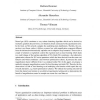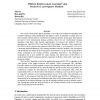17 search results - page 3 / 4 » Fast gradient-descent methods for temporal-difference learni... |
150
click to vote
ICML
2006
IEEE
2006
IEEE
Automatic basis function construction for approximate dynamic programming and reinforcement learning
15 years 8 months ago
We address the problem of automatically constructing basis functions for linear approximation of the value function of a Markov Decision Process (MDP). Our work builds on results ...
131
click to vote
ESANN
2006
15 years 3 months ago
2006
Neural gas (NG) constitutes a very robust clustering algorithm which can be derived as stochastic gradient descent from a cost function closely connected to the quantization error...
115
click to vote
JMLR
2006
15 years 2 months ago
2006
In this article we describe a set of scalable techniques for learning the behavior of a group of agents in a collaborative multiagent setting. As a basis we use the framework of c...
124
Voted
ATAL
2008
Springer
15 years 4 months ago
2008
Springer
In reinforcement learning, least-squares temporal difference methods (e.g., LSTD and LSPI) are effective, data-efficient techniques for policy evaluation and control with linear v...
143
click to vote
JAIR
2002
15 years 2 months ago
2002
The recursive least-squares (RLS) algorithm is one of the most well-known algorithms used in adaptive filtering, system identification and adaptive control. Its popularity is main...


